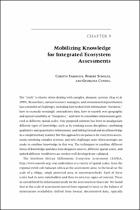JavaScript is disabled for your browser. Some features of this site may not work without it.
- ResearchSpace
- →
- Research Publications/Outputs
- →
- Book Chapters
- →
- View Item
| dc.contributor.author |
Fabricius, C

|
|
| dc.contributor.author |
Scholes, RJ

|
|
| dc.contributor.author |
Cundill, G

|
|
| dc.date.accessioned | 2007-07-04T11:56:10Z | |
| dc.date.available | 2007-07-04T11:56:10Z | |
| dc.date.issued | 2006 | |
| dc.identifier.citation | Fabricius, C, Scholes, RJ and Cundill, G. 2006. Mobilising knowledge for ecosystem assessments. Bridging scales and knowledge systems: Concepts and applications in ecosystem assessment. Washington DC: Island Press, pp 1-18 | en |
| dc.identifier.uri | http://hdl.handle.net/10204/970 | |
| dc.description.abstract | The Southern African Millennium Ecosystem Assessment (SAfMA, http://www.maweb.org) was undertaken at a variety of spatial scales, from the regional (with sub-Saharan Africa as the assessment area) to the local (at the scale of a village, single protected area, or micro watershed). Each of these scales had its own stakeholders and thus its own key topics of concern. These in turn defined the information needs for the assessment at that scale. The authors found that as the scale of assessment moved from regional to local, the balance of information availability shifted from formal, documented data, typically regarded as being in the “scientific domain,” toward informal, tacit information contained in the life experience of local residents and in folklore transmitted by oral tradition, or perhaps documented but not in accordance with conventional scientific standards. According to the authors the distinction between “formal” and “informal” knowledge is not as absolute as is often thought. They point out that both use broad principles, similar rules and validation, although the procedures may differ. Elements of both sorts of knowledge exist at all scales, although informal knowledge is generally more site specific and restricted by design and circumstances than scientific knowledge is. | en |
| dc.language.iso | en | en |
| dc.subject | Millennium ecosystem assessment | en |
| dc.subject | Knowledge exchange | en |
| dc.subject | Ecosystems | en |
| dc.subject | Scientific research | en |
| dc.title | Mobilising knowledge for ecosystem assessments | en |
| dc.type | Book Chapter | en |
| dc.identifier.apacitation | Fabricius, C., Scholes, R., & Cundill, G. (2006). Mobilising knowledge for ecosystem assessments., <i></i> http://hdl.handle.net/10204/970 | en_ZA |
| dc.identifier.chicagocitation | Fabricius, C, RJ Scholes, and G Cundill. "Mobilising knowledge for ecosystem assessments" In <i></i>, n.p.: n.p. 2006. http://hdl.handle.net/10204/970. | en_ZA |
| dc.identifier.vancouvercitation | Fabricius C, Scholes R, Cundill G. Mobilising knowledge for ecosystem assessments. [place unknown]: [publisher unknown]; 2006. [cited yyyy month dd]. http://hdl.handle.net/10204/970. | en_ZA |
| dc.identifier.ris | TY - Book Chapter AU - Fabricius, C AU - Scholes, RJ AU - Cundill, G AB - The Southern African Millennium Ecosystem Assessment (SAfMA, http://www.maweb.org) was undertaken at a variety of spatial scales, from the regional (with sub-Saharan Africa as the assessment area) to the local (at the scale of a village, single protected area, or micro watershed). Each of these scales had its own stakeholders and thus its own key topics of concern. These in turn defined the information needs for the assessment at that scale. The authors found that as the scale of assessment moved from regional to local, the balance of information availability shifted from formal, documented data, typically regarded as being in the “scientific domain,” toward informal, tacit information contained in the life experience of local residents and in folklore transmitted by oral tradition, or perhaps documented but not in accordance with conventional scientific standards. According to the authors the distinction between “formal” and “informal” knowledge is not as absolute as is often thought. They point out that both use broad principles, similar rules and validation, although the procedures may differ. Elements of both sorts of knowledge exist at all scales, although informal knowledge is generally more site specific and restricted by design and circumstances than scientific knowledge is. DA - 2006 DB - ResearchSpace DP - CSIR KW - Millennium ecosystem assessment KW - Knowledge exchange KW - Ecosystems KW - Scientific research LK - https://researchspace.csir.co.za PY - 2006 T1 - Mobilising knowledge for ecosystem assessments TI - Mobilising knowledge for ecosystem assessments UR - http://hdl.handle.net/10204/970 ER - | en_ZA |






